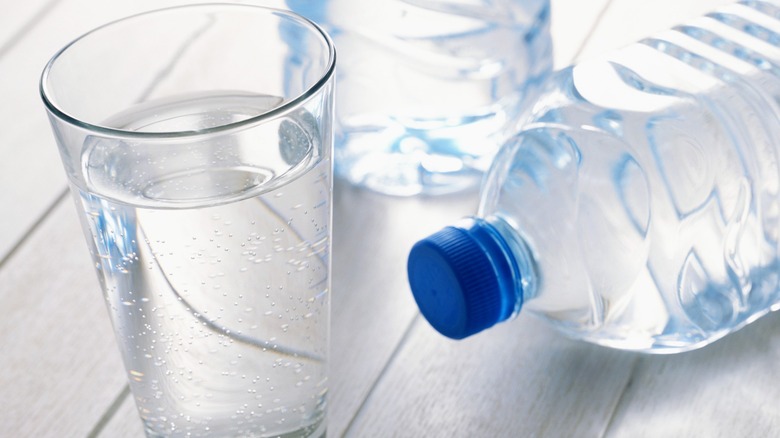Here's What Happens If You Regularly Drink Alkaline Water
Maybe you were browsing the all-too-extensive water bottle section in the grocery store. There, perhaps, among the myriad selection of water bottles of all different shapes and sizes emblazoned with mountain streams and waterfalls of varying beauty and tranquility, you found one that claimed to be alkaline. This very scientific-sounding word is intriguing, and if you look it up, you'll find lots of health claims that have been made about alkaline water.
Some have said that it will improve the drinker's metabolism or build the drinker's energy or even that you get more hydrated by drinking it than regular water. Others have gone even further, saying that it can slow the aging process or prevent cancer, bone loss, or heart disease. Those are big claims, but overwhelmingly, medical sources say that these benefits are unsubstantiated by significant research.
According to Harvard Health Publishing, there is no evidence for alkaline water being better for you than non-alkaline bottled water or even just tap water. If you regularly drink alkaline water, most likely not much will happen — it may taste slightly bitter and upset your stomach or it may cause your skin to become slightly dry. Otherwise, it probably won't accomplish much.
But what exactly is alkaline water?
To understand the issue more fully, it's useful to talk all about water. In very simple terms, alkaline water is merely water that has a higher pH than that of regular water. The pH scale measures the acidity or alkalinity of a fluid — regular water typically hovers around a pH of 7, which is neutral. Alkaline water has a slightly higher pH of around 8 or 9. Some of the proponents of drinking alkaline water claim that regular water (or water with an even lower pH than 7) puts too much acid in your bloodstream and that lower pH water can lead to many health problems, even diseases as serious as cancer.
When you swallow that alkaline water, though, and it reaches your very acidic stomach fluid, any slight differences between the alkaline and the regular waters will be negated and any effect on the pH of your stomach fluid won't last. This also means that alkaline water is pretty ineffective for heartburn relief, which has been another claim made about its benefits. The same can be said for any potential effects on your blood's pH — your kidneys would do their job to bring it back into stability very quickly. Your body's already existing processes for regulating itself mean that alkaline water doesn't make much of a difference.
Are there any downsides to drinking alkaline water?
At the same time that the benefits of alkaline water have not been substantially supported by research, there also has not been much evidence of any significant existing risks. Generally speaking, alkaline water is safe to drink, although your skin could dry out from the higher pH and the water might have a more bitter taste than regular water. However, the risks can be more substantial for people with certain medical conditions.
If you have kidney disease, strong alkaline water could change the levels of chemicals like potassium in your blood, according to Harvard Health Publishing. If you use something like a proton pump inhibitor for stomach acid, strong alkaline water could be a problem, too – and potentially dangerous.
At the end of the day, regularly drinking alkaline water doesn't have significant downsides for those without these medical conditions — but it's probably not helping you, either, according to current research. It is most likely just a marketing tactic to make a water bottle brand that's more expensive, only to change something in your body that your body is just going to change right back.


